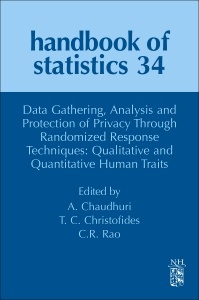Data Gathering, Analysis and Protection of Privacy Through Randomized Response Techniques: Qualitative and Quantitative Human Traits Handbook of Statistics Series

Data Gathering, Analysis and Protection of Privacy through Randomized Response Techniques: Qualitative and Quantitative Human Traits tackles how to gather and analyze data relating to stigmatizing human traits. S.L. Warner invented RRT and published it in JASA, 1965. In the 50 years since, the subject has grown tremendously, with continued growth. This book comprehensively consolidates the literature to commemorate the inception of RR.
1. Review of Certain Recent Advances in Randomized Response Techniques T.J. Rao and CR Rao 2. The background and genesis of Randomized Response Techniques Arijit Chaudhuri 3. How Randomized Response Techniques Need Not be Confined to Simple Random Sampling but Liberally Applicable to General Sampling Schemes Arijit Chaudhuri 4. The Classical Randomized Response Techniques Tasos Christofides 5. On the estimation of correlation coefficient using scrambled responses Sarjinder Singh 6. Admissible and Optimal Estimation in Finite Population Sampling under Randomized Response Models Samindranath Sengupta 7. A mixture of true and randomized responses in the estimation of the number of people having a certain attribute Andreas Quatember 8. Estimation of complex population parameters under the randomized response theory Lucio Barabesi 9. An Efficient Randomized Response Model Using Two Decks of Cards Under Simple and Stratified Random Sampling Sally Abdelfatah and Reda Mazloum 10. Software for Randomized Response Techniques Maria del Mar Rueda 11. Post-Stratification based on the Choice of Use of a Quantitative Randomization Device Oluseun Odumade 12. Variance Estimation in Randomized Response Surveys Arun Kumar Adhikary 13. Behavior of some scrambled randomized response models under simple random sampling, ranked set sampling and Rao-Hartley-Cochran designs Carlos N. Bouza-Herrera 14. Estimation of a Finite Population Variance under Linear Models for Randomized Response Designs Parimal Mukhopadhyay 15. Randomized Response and New Thoughts on Politz-Simmons Technique T.J. Rao 16. Optional Randomized Response: A Critical Review Raghunath Arnab 17. A Concise Theory of Randomized Response Techniques for Privacy and Confidentiality Protection Tapan Nayak 18. A review of regression procedures for randomized response data, including univariate and multivariate logistic regression, the proportional odds model and item response models Peter van der Heijden 19. Eliciting Information on Sensitive Features: Block Total Response Technique and Related Inference Bikas Kumar Sinha 20. Optional Randomized Response Revisited Rahul Mukerjee 21. Measures of respondent privacy in randomized response surveys Mausumi Bose 22. Cramer-Rao lower bounds of variance for estimating two proportions and their overlap by using two-decks of cards Sarjinder Singh 23. Estimating a finite population proportion bearing a sensitive attribute from a single probability sample by Item Count Technique Purnima Shaw 24. Surveying a varying probability Adaptive Sample to Estimate Cost of Hospital Treatments of sensitive diseases by RR Data Gathering Sanghamitra Pal 25. Estimation of means of two rare sensitive characteristics: Cramer-Rao lower bound of variances Sarjinder Singh 26. Estimating sensitive population proportion by generating randomized response following direct and inverse hypergeometric distribution Kajal Dihidar 27. Incredibly efficient use of a Negative Hypergeometric distribution in randomized response Techniques Sarjinder Singh 28. Comparison of Different Imputing Methods for Scrambled Responses Sarjinder Singh 29. On an indirect response model V R. Padmawar
- Brings together all relevant aspects of randomized response and indirect questioning
- Tackles how to gather and analyze data relating to stigmatizing human traits
- Gives an encyclopedic coverage of the topic
- Covers recent developments and extrapolates to future trends
Date de parution : 04-2016
Ouvrage de 544 p.
15x22.8 cm
Thème de Data Gathering, Analysis and Protection of Privacy... :
Mots-clés :
Admissibility; Balanced incomplete block design; Bernoulli model; Binary proper equireplicate block design; Block total response technique; Counting model; Data imputation; Empirical Bayes estimators; General probability sampling; Horvitz-Thompson estimator; Indirect response; Kim-Warde model; Noise; Nonresponse; Optimality; Padmawar-Vijayan model; Poisson model; Population mean; Population proportion; Pseudo-population; Pure noise model; Randomized response; Randomized response technique; Regular feature; Sampling strategy; Sensitive feature; Super-population model; Unbiased estimator; Unrelated question model; Variance estimation; Warner's model; Weighting adjustment; Yu-Tian-Tang models


